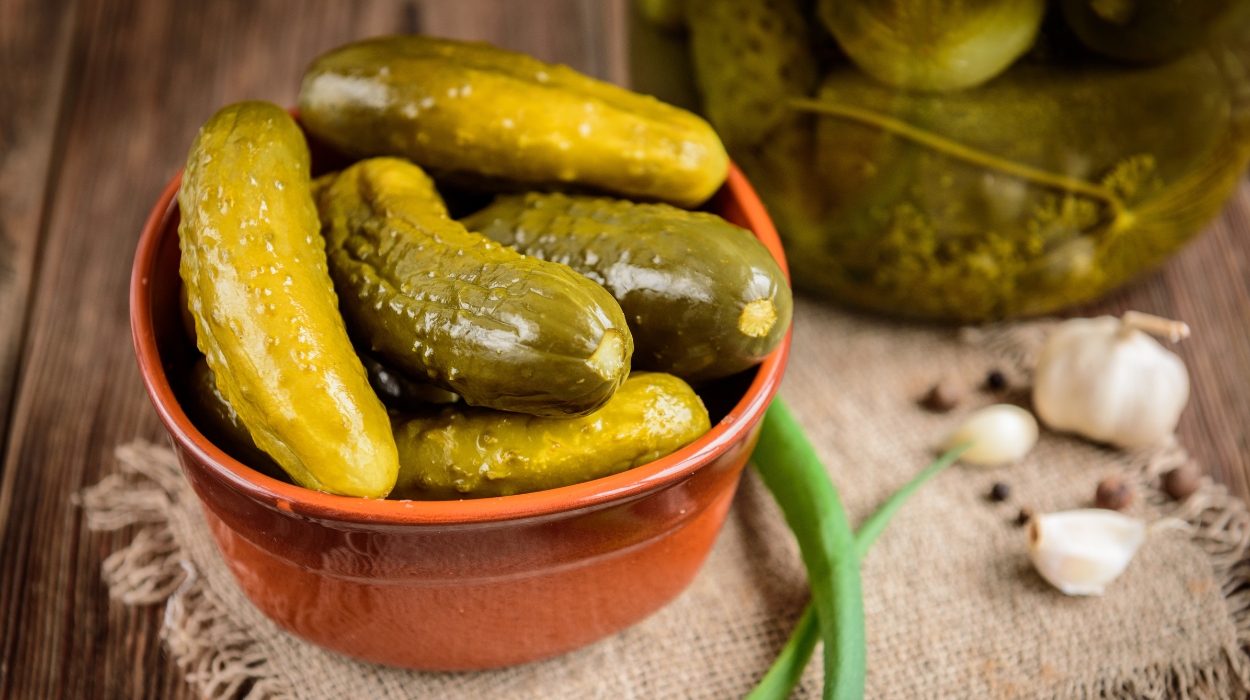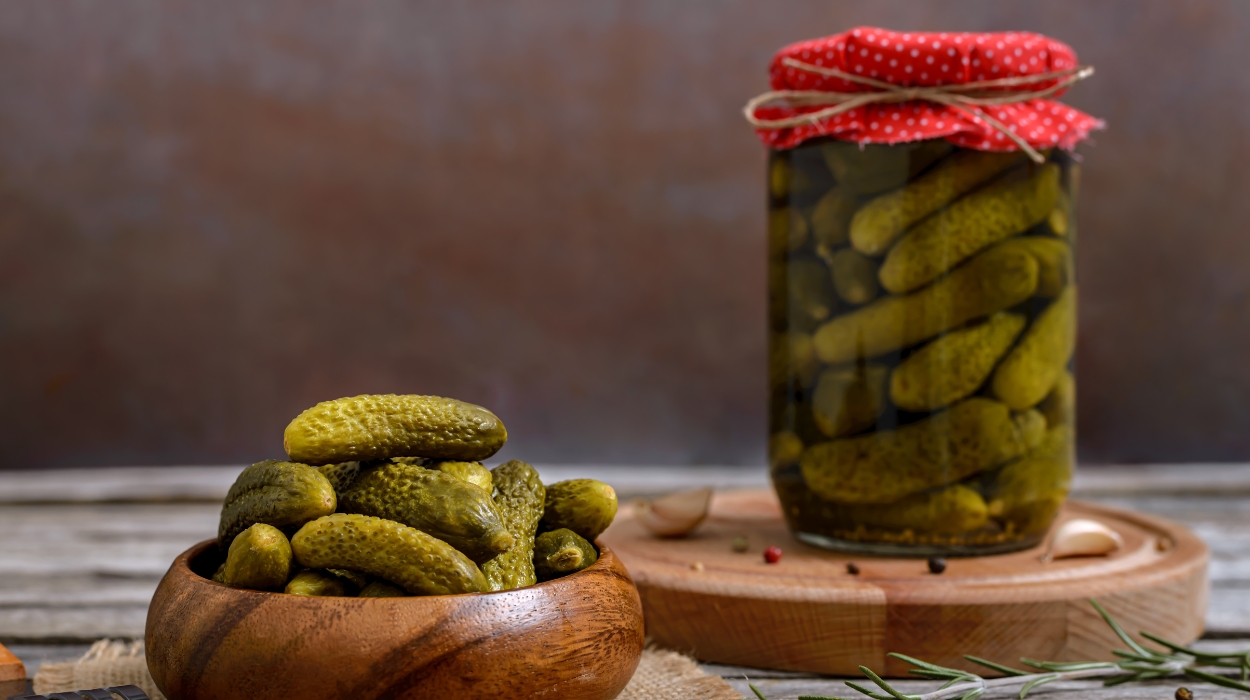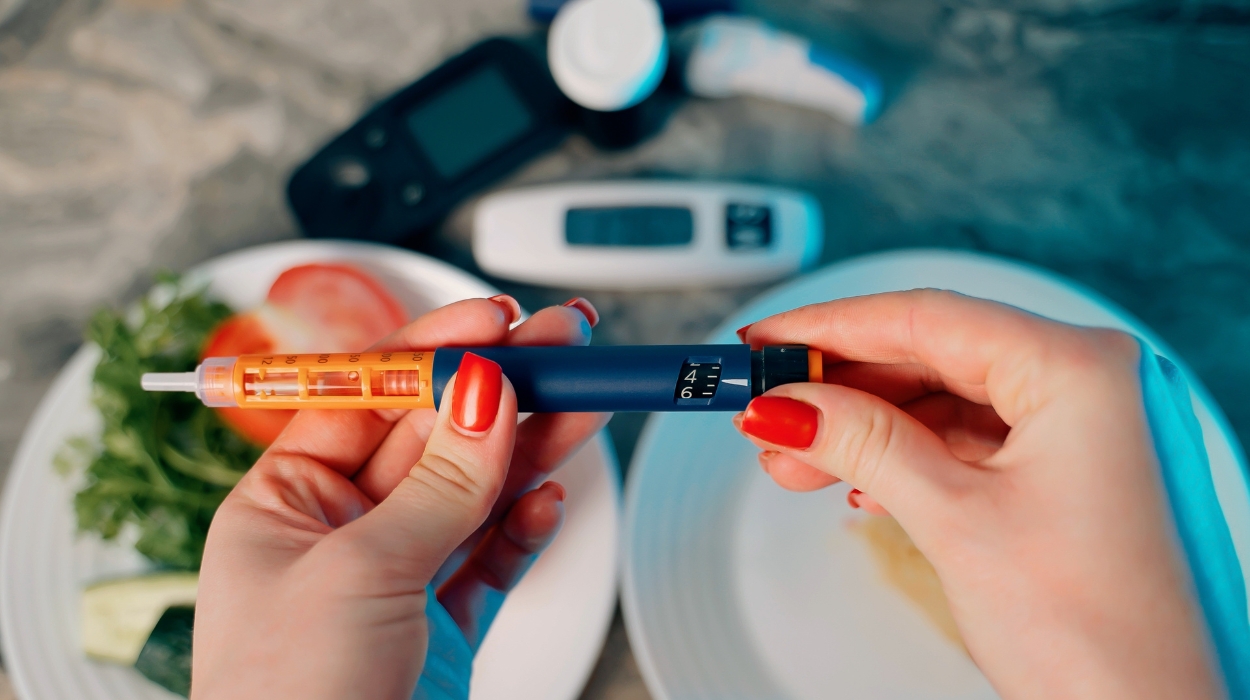 Expert's opinion
Expert's opinion
Expert's opinion
The article is a subjective view on this topic written by writers specializing in medical writing.
It may reflect on a personal journey surrounding struggles with an illness or medical condition, involve product comparisons, diet considerations, or other health-related opinions.
Although the view is entirely that of the writer, it is based on academic experiences and scientific research they have conducted; it is fact-checked by a team of degreed medical experts, and validated by sources attached to the article.
The numbers in parenthesis (1,2,3) will take you to clickable links to related scientific papers.
Pickles And Diabetes 2024: Are Pickles Good For Diabetes?

Pickles have earned a special spot on mealtime plates worldwide. Are you aware that pickles can be a surprisingly diabetes-friendly food choice that works well in a balanced diet, thanks to their distinct taste combinations and nutritional qualities? And do you know that pickles can also provide several other health benefits, including helping to improve gut health?
Welcome! We’re excited to take you on a tour through the fascinating world of pickles, where the tangy flavors can enrich your culinary experiences and provide numerous health benefits. This article will answer the question: “Are pickles good for diabetes?” and examine this delicious food’s health benefits and many other aspects.
Is Pickle Good For Diabetes?
Yes, pickles can be good for diabetes. In addition to their delicious flavor and satisfying crunch, they can be a safe addition to a well-balanced diet for those with diabetes.
However, a few things, such as added sugar, sodium content, and portion size, should be considered.
Pickles And Diabetes: Are Pickles Safe For Diabetes?
Pickled foods can be a safe, suitable, and excellent addition to the healthy diet for people with diabetes for several reasons.
First, pickles typically contain little to no carbohydrates. Thus, they have a low glycemic index and a minimal effect on blood sugar levels. This can help people with diabetes control their blood sugar spikes more effectively.
Moreover, pickles are also low in calories and fat, which makes them a healthy snack choice and food for diabetes.
Consuming pickles with low sodium content and no added sugars is preferred, as both of these factors might impact blood pressure and blood sugar levels, respectively.
What Are Pickles?

Pickles are culinary creations made through the pickling or preserving of cucumbers. Pickling[1] involves submerging fruits or vegetables in a vinegar or brine solution to create a tangy taste. This process creates an acidic environment that prevents bacterial growth and extends their shelf life for preservation.
Pickles can also undergo a natural fermentation process, adding beneficial lactic acid bacteria and creating products that can be enjoyed as sauce, snacks, and recipe ingredients.
While many foods can be pickled, cucumbers are the most commonly pickled food. Pickles can range in flavor from sweet to spicy and are often enjoyed as a condiment or snack. For example, bread and butter pickles can make great toppings for burgers, or they can be enjoyed on their own!
Glycemic Index For Pickles
People with diabetes may be familiar with the glycemic index. If you’re not, the glycemic index, or GI, is a useful tool for assessing how carbohydrate-containing foods affect your blood sugar levels. Foods are ranked on a scale from zero to 100 based on how quickly they raise your blood sugar.
Pickles are mostly made up of vegetables, such as cucumber slices, which are generally considered a low-glycemic index food. Additionally, adding vinegar can further delay gastric emptying[2] (i.e., digestion), which is thought to lower the glycemic index of pickles even more.
So, while pickles’ glycemic index can vary based on the variety and recipe, it is generally pretty low.
Benefits Of Eating Pickles
These crunchy delights are a beloved condiment enjoyed worldwide. Not only are they tasty and nutritious, but they also offer many other benefits, which may include:
- Low in calories and fat.
- Rich in essential nutrients.
- Source of antioxidants.
- Probiotic properties.
- Appetite stimulation.
- Versatility.
- Refreshing and satisfying.
Pickles Are Low In Calories And Fat
Dill pickles can make a terrific snack for anyone watching their calorie and fat intake. While they may be packed with flavor, they’re not packed with calories. Dill pickles have a total energy content[3] of 14 calories, 0.48 grams of protein, 1.99 grams of carbohydrates, and 0.43 grams of fat per 100-gram serving.
They Are Rich In Essential Nutrients
Tangy pickles are loaded with vital nutrients. Pickles contain a plethora of vitamins, minerals, and antioxidants. These nutrients, often found in health supplements, can boost multiple biological processes and sustain overall good health.
Source Of Antioxidant
Pickles made from vegetables like cucumbers, onions, carrots, and beets contain vitamin C, flavonoids, lycopene, and anthocyanins, all of which have antioxidant, anti-inflammatory,[4] and heart-protective properties.
The antioxidants[5] can help the body fight off free radicals that can contribute to aging and chronic diseases.
Probiotic Properties
Naturally fermented pickled cucumbers include beneficial microorganisms that function as probiotics. These probiotics support digestion and a healthy gut. They promote regular bowel movements and can therefore help alleviate occasional constipation symptoms.
Appetite Stimulation
The sour taste of pickles can stimulate the appetite[6] and add a burst of flavor to meals. This can enhance the overall dining experience and increase the pleasure factor of your meal.
Versatility
Pickles can be consumed in a variety of manners. Sweet pickles can be consumed as a snack or eaten alongside sandwiches, burgers, or salads. You might even include them in different recipes depending on your preferences.
Refreshing And Satisfying
Pickles provide a crisp, revitalizing crunch that might kick cravings for other crunchy, higher-calorie foods like potato chips. This can satisfy a snack craving without blowing your daily calorie budget.
And, remember, drinking pickle juice after a hard workout is refreshing and can replace lactobacillus, an important gut bacteria.
Things To Consider
Pickles are a delectable and versatile food option. But to have a healthy and delightful pickle experience, you should consider a few things before you take a bite.
Sodium Content
Pickles can contain excessive sodium since salt or brine is used during the pickling process. Choose low-sodium or reduced-salt versions if you’re managing your sodium intake, or consider creating your own pickles with less salt. Remember that eating too many pickles may result in a high sodium intake, which may lead to high blood pressure.
Added Sugar
Pickles prepared commercially occasionally contain extra sugars that can increase blood sugar levels. These pickles may not be the ideal choice for people with diabetes.
Choose sweet pickles without added sugars by examining the label. Or better yet, make your own pickles at home.
Portion Size
Pickled food can be a healthy snack, but paying attention to your portion sizes is important. Pickles, especially those with a high sodium content, should be consumed in moderation to avoid too much sodium intake, increased risk of heart disease, and gastrointestinal problems.
Ingredient Quality
When buying pickles, check the ingredient list. Consider choosing pickles that have their juice created with natural, fresh ingredients and no artificial preservatives or additives. Ensure the ingredients are healthy for people with diabetes and won’t raise blood sugar levels.
Personal Sensitivities
If you have any food allergies to the ingredients present in pickles, you should avoid them completely.
Homemade Options
Consider creating your own pickles and pickle juice at home with fresh ingredients, salt-, and sugar-free brine. Making your fermented foods gives you more control over the pickling process.
Balanced Diet
Pickles can add richness to dishes, but it’s necessary to include them as part of a balanced diet containing a range of fruits, vegetables, complete grains, proteins, and other essential elements.
Tips For Eating Pickles If You Have Diabetes

You’ll be happy to learn that if you have diabetes and adore pickles, you can still enjoy this tart snack while controlling your blood glucose levels. By choosing wisely and not overdoing it, you can enjoy pickles in moderation if you have diabetes.
Additionally, it is always a good idea to speak with a healthcare practitioner or registered dietitian to address your individualized nutrition requirements and design a diabetic meal plan that meets your needs.
The Bottom Line
Pickles can be a tasty addition to your diet, giving your foods a sour and crunchy edge. However, those living with diabetes need to consider a few things when eating pickles.
Choose pickles low in sodium and sugar to significantly reduce blood sugar spikes and maintain stable levels. If you have type 2 diabetes, you can eat dill pickles unless otherwise directed by your doctor. Other important tactics include reading labels, eating in moderation, and including pickles in a balanced diet.
You have even more control over the ingredients when you make your own pickles, allowing you to modify the recipe to fit your dietary requirements. By adhering to these suggestions, you can enjoy pickles’ distinctive flavors while promoting your general health and well-being.
Frequently Asked Questions
Yes. Pickle juice can help stabilize blood sugar levels in people with diabetes due to its vinegar, low-carbohydrate, and high-fiber content. It should be consumed in moderation and as part of an overall balanced diet.
While pickles themselves may not directly decrease blood sugar levels, they can contribute to overall blood sugar management when consumed as part of a balanced diet.
Moderation is key when it comes to consuming pickles, as with any food item.
Due to their high sodium content, pickles should be consumed in moderation by those with kidney disease, hypertension, or other conditions requiring a low-sodium diet. It is best to ask a healthcare expert for individualized advice.
Yes, they are, but dill pickles may be the best option for those with type 2 diabetes.
+ 7 sources
Health Canal avoids using tertiary references. We have strict sourcing guidelines and rely on peer-reviewed studies, academic researches from medical associations and institutions. To ensure the accuracy of articles in Health Canal, you can read more about the editorial process here
- Food and Agriculture Organization of the United Nations (1947). Food and Agriculture Organization of the United Nations. International Organization, 1(02), p.350. doi:https://doi.org/10.1017/s0020818300006160.
- Mohammad Hossein Rouhani, Fahimeh Agh and Azadbakht, L. (2018). Pickle Consumption is Associated with Body Mass Index and Blood Pressure among Iranian Female College Students: a Cross-Sectional Study. [online] doi:https://doi.org/10.7762/cnr.2018.7.4.256.
- Usda.gov. (2023). FoodData Central. [online] Available at: https://fdc.nal.usda.gov/fdc-app.html#/food-details/324653/nutrients.
- Palanisamy Arulselvan, Masoumeh Tangestani Fard, Woan Shin Tan, Sivapragasam Gothai, Sharida Fakurazi, Norhaizan Mohd Esa and Kumar, S. (2016). Role of Antioxidants and Natural Products in Inflammation. [online] 2016, pp.1–15. doi:https://doi.org/10.1155/2016/5276130.
- Chakraborty, R. and Roy, S. (2018). Exploration of the diversity and associated health benefits of traditional pickles from the Himalayan and adjacent hilly regions of Indian subcontinent. [online] 55(5), pp.1599–1613. doi:https://doi.org/10.1007/s13197-018-3080-7.
- Working, I. (2023). PICKLED VEGETABLES. [online] Nih.gov. Available at: https://www.ncbi.nlm.nih.gov/books/NBK513652/.



